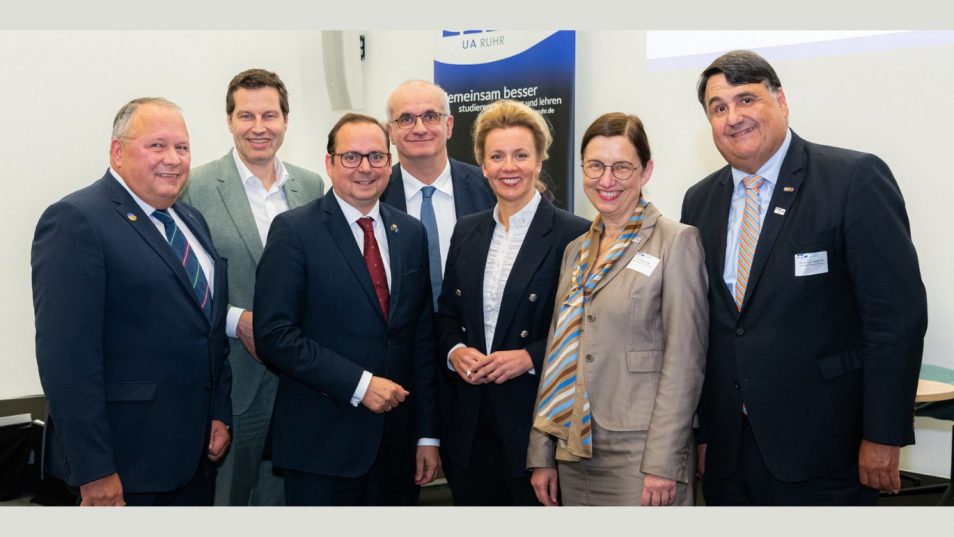Strong Start for the Research Alliance Ruhr
 © UA Ruhr / Simon Bierwald
© UA Ruhr / Simon Bierwald
With around 100 guests from the realms of politics and science, the University Alliance Ruhr (UA Ruhr) celebrated the opening of the Research Alliance Ruhr in Essen on October 24, 2023. Founded in 2021, on the initiative of the Ruhr Conference, 50 joint research professorships are being established here to address pressing questions about the future. NRW Science Minister, Ina Brandes, praised the successful collaboration between Ruhr-Universität Bochum, the University of Duisburg-Essen, and TU Dortmund University.
In the Research Alliance Ruhr, the three partners of the UA Ruhr combine their top-level international research. Four joint research centers are being set up here that address the topics of health and the environment, sustainable chemistry, new energy systems and data security. Furthermore, the College for Social Sciences and Humanities promotes international exchange on a wide range of topics. The state government is financing the development phase from 2022 to 2025 with a total of 123 million euros.
The grand opening of this cross-university project focused on the question of how cooperation in science advances the Ruhr area – and vice versa. The event location in downtown Essen was already a clear indicator of change: The joint college recently moved into a listed building on Lindenallee, where international guest researchers are set to start working in the spring. At the evening welcome, Prof. Dr. Barbara Albert, President of the University of Duisburg-Essen, praised the successful development work that the three partners have already done over the past few months: The first 14 professorships for the research centers have already been filled with leading international academics, including some from the Weizmann Institute of Science in Israel, the University of Cambridge, United Kingdom, as well as from Portugal and Italy. “We have appointed excellent, internationally renowned researchers to the Ruhr area to join the Research Alliance. They are among the best minds in their fields. This shows just how competitive we are. We are very excited about the fresh ideas that will come from them.”
Unique research landscape
In her speech, Ina Brandes, Minister for Culture and Science of North Rhine-Westphalia, emphasized the importance of the Ruhr region to the state’s ability to innovate: “The research landscape in the Ruhr area with five universities, 15 universities of applied sciences, four Max Planck Institutes, five Fraunhofer Institutes and four Leibniz Institutes is unique in Europe. This is where solutions for the major challenges facing the future are conceived, developed and put into practice. The Research Alliance Ruhr stands for cutting-edge research ‘made in NRW’. It will make a significant contribution to finding solutions to the pressing questions facing the future and securing people’s prosperity.”
Prof. Dr. Manfred Bayer, President of TU Dortmund University, emphasized the strong foundation on which the Research Alliance Ruhr is built: “The three universities have been cooperating with each other at UA Ruhr since 2007,” said the physicist, who was appointed as a UA Ruhr professor himself in 2019. “Here we contribute our respective strengths, harness synergies and offer the freedom for cross-disciplinary scientific collaboration.” As the densest university landscape in Europe, the Ruhr metropolitan area is predestined for academic cooperation. “With the Research Alliance, top international research has a new home in the Ruhr area, a region synonymous with successful transformation,” said Prof. Dr. Martin Paul, President of Ruhr-Universität Bochum (RUB). “With this experience, we will also be able to overcome the current challenges and transformation work – not least thanks to the strong research that allows for new solutions.”
Interdisciplinary research questions
The Research Alliance Ruhr emerged from an ideas competition announced by the North Rhine-Westphalia state government at the Ruhr Conference in 2019. As Josef Hovenjürgen, Parliamentary State Secretary for the Special Affairs of the Ruhr Area, summarized: “From the perspective of the Ruhr Conference, the Research Alliance is a shining example, even beyond academia, of what can be achieved in the Ruhr area if we rely on collaboration and togetherness.”
On the evening, University Management, founding directors and new appointees discussed what opportunities the Research Alliance Ruhr offers and what interdisciplinary research questions it addresses. The focus was on how artificial intelligence can accelerate the search for new materials for the energy transition, how chemical research could help reduce greenhouse gases in concrete production, or how the renaturation of the Emscher river could help create social meeting spaces to fight loneliness. Prof. Christina Elmer, professor of data journalism at TU Dortmund University, moderated the event.
About the UA Ruhr
Ruhr University Bochum, TU Dortmund University and the University of Duisburg-Essen have been closely collaborating as strategic partners under the UA Ruhr umbrella since 2004. By joining forces, these partner universities are able to systematically enhance their performance. Under the motto “Better Together”, there are now over 100 collaborations being conducted in research, teaching, and administration. With more than 120,000 students and almost 1,300 professors, the UA Ruhr is one of the largest and most productive scientific locations in Germany.
More about the Research Alliance Ruhr
Photo: (from right to left): Prof. Dr. Martin Paul, Rector of the Ruhr University Bochum, Prof. Dr. Barbara Albert, Rector of the University of Duisburg-Essen, Ina Brandes, Minister for Culture and Science of North Rhine-Westphalia, Prof. Dr. Manfred Bayer, Rector of TU Dortmund University, Thomas Kufen, Lord Mayor of the City of Essen, Thomas Eiskirch, Lord Mayor of the City of Bochum, and Josef Hovenjürgen, Parliamentary State Secretary for the Special Affairs of the Ruhr Area.
